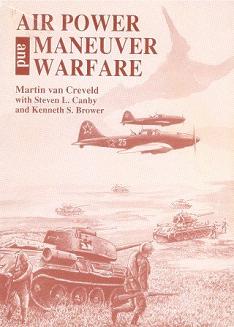
Air Power and Maneuver Warfare
Martin van Creveld, Steve Canby & Ken Brower
268 pages including index
published in 1994
Air Power and Maneuver Warfare is a strange book. At first it seems to be just a theoretical and historical overview of how air power and maneuver warfare fit together, but something seemed off from the start. This book was commissioned by the US Airforce’s Air War College just after the Cold War had ended and more importantly, the US military establishment finally started to be convinced of this. It’s a political document as much as a theoretical one, written for an audience that’s supposed to be familiar with the theory of “maneuver warfare” (sic) but who do needed to be convinced of the argument Creveld and his co-authors are putting forward.
Said argument seems to be that the US Army needs to move away from its historical attrition warfare, linear orientation towards a more flexible maneuver orientated attitude, to be better able to deal with the challenges a post-Cold War world will throw at it. Meanwhile the airforces also need to shift towards a more tactical support role for the army rather than being obsessed with strategic air warfae and air defence suppression. This latter is not a new criticism of course, as ever since the USAF became a seperate arm of the armed forces it has been accused of neglecting tactical air support. The irony of it all is that while van Creveld and his co-authors (politely) argue that the then current strategic orientation of the US Armed Forces is outdated and inadequate to deal with the complexities of a post-Cold War world, their own recommendations are just as much a product of Cold War thinking, assuming that potential opponents will need to be and can be defeated by conventional military operations.